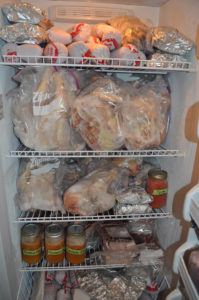 Meat labels are a relatively recent addition to human civilization, a tool that most people use regularly whenever purchasing food. It should go without saying that in order for food labeling to work, we have to trust it implicitly. In order to gain that trust, most jurisdictions rigorously regulate food products, especially meat and meat labels. But sometimes things go wrong, as demonstrated by a recent case in Bengal Province, India.
Meat labels are a relatively recent addition to human civilization, a tool that most people use regularly whenever purchasing food. It should go without saying that in order for food labeling to work, we have to trust it implicitly. In order to gain that trust, most jurisdictions rigorously regulate food products, especially meat and meat labels. But sometimes things go wrong, as demonstrated by a recent case in Bengal Province, India.
In May 2018, police in the city of Kolkata raided a number of meat providers and discovered that they were passing off rotten meat to their customers that had, in many cases, literally been dug out of the garbage! One provider had 20,000 kg (44,000 lbs) worth of rotting carcasses in its freezers, which it was processing and packaging for sale to local restaurants and food stores. In some cases, the processor was using packages with labels from legitimate, well-trusted processors so that those who bought it wouldn’t question its quality. They legitimate processors were not associated with those meat packers in any way. It isn’t clear how the rest of the meat was packages, but obviously the meat labels were falsified—if they had any.
Kolkata restaurants soon reported that sales of meat-based dishes had dropped by up to 60% or more. For a while, people avoided all meat except chicken; then it came to light that some providers were selling rotten chicken too, and the sales of chicken plunged as well. Vegetarian dishes became popular. Two months later, the sales of meat dishes still haven’t risen to normal levels. Meat sales in butcher shops and food stores have also dropped sharply.
Sadly, reporters later learned that food safety in Bengal has been compromised for years, and that the government agency tasked with overseeing food quality, the Food Safety and Standards Authority of India, was quite aware of this. In 2014-2015, tests of 120 food samples showed that over half of the samples had been adulterated in some way. What the FSSAI had done about the issue, if anything, is still unclear.
The emphasize how bad the situation was, the perpetrators were literally picking up carcasses of dead animals from garbage dumps after they were dropped off. At one landfill, they even had a person on the inside who let them know when someone dumped an animal carcasses. So far, at least ten people have been arrested, and one is missing. Apparently, he fled to neighboring Bangladesh.
Local restaurants and stores have made a concerted effort to check their meats to make sure they bought none from the providers implicated in the scandal. Some have gone so far as to publish the sources of their meats in public forums. However, the tainted meat was definitely sold throughout Kolkata and elsewhere in India, and even abroad; so some of the restaurants and grocers have in fact been feeding it to customers, however unwittingly. How long it will take for the local populace to regain their trust in local restaurants and stores remains to be seen.
The Kolkata scandal emphasizes the importance of high-quality meat labels that follow government standards—and why you should never buy meat products that lack such labels. As annoying as some government labeling requirements may be, the reasons for their existence is clear when something like this happens. We depend on meat packers to be up-front and honest about the quality and freshness of their meats, and to tell us the use-by date. When that trust is violated, it’s hard to know what to think… and all meat becomes suspect.
If it could happen in a cosmopolitan city like Kolkata, it could happen anywhere. So be sure to stick with a top-notch label provider for your top-quality meats, because if your market loses faith in your products, you may never get it back.






